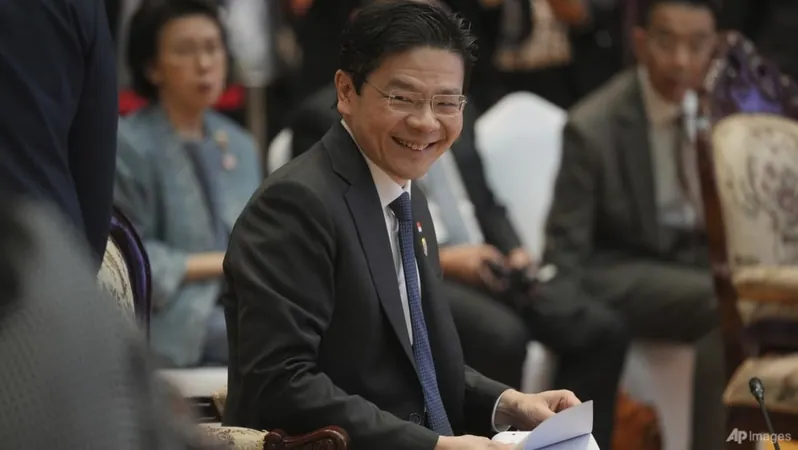
ASEAN Faces a Green Future: PM Wong Calls for Cooperative Action on Emissions and Energy
2024-10-09
Author: Mei
VIENTIANE
During the ASEAN summit held in Vientiane on October 9, Singapore's Prime Minister Lawrence Wong emphasized that Southeast Asia must pursue economic growth while significantly lowering carbon emissions. "We must grow with less emissions than before," Wong underscored, highlighting the urgency of transitioning to low carbon and renewable energy solutions to meet regional emissions targets.
Wong argued that while individually addressing this challenge is daunting, collaboration within ASEAN can accelerate progress. He urged fellow leaders to establish robust regulatory and commercial frameworks to facilitate cross-border energy trade, a crucial step in developing an ASEAN power grid aimed at achieving sustainable energy goals.
With the ASEAN commitment to establish a framework for subsea power cables by the end of this year, he encouraged member states to draw lessons from the existing regional framework for fiber-optic cables. Furthermore, he called on external partners, including the World Bank and the Asian Development Bank, to provide necessary financing for the ASEAN power grid, referring to it as a "critical project" for the region.
Harnessing the Digital Economy
In addition to energy initiatives, Wong extolled the vast potential of the ASEAN digital market, heralding it as a key enabler for small and medium enterprises (SMEs). He announced the goal of finalizing an ASEAN Digital Economy Framework Agreement by next year, which is expected to unlock this potential. Additionally, he touched upon the importance of leveraging new digital technologies while also addressing associated risks.
Wong introduced the ASEAN Guide on AI Governance and Ethics as a framework to ensure reliable development of artificial intelligence in a safe manner and potentially set global norms. He also stressed the necessity of strengthening regional cybersecurity as a foundational element of the digital ecosystem.
Navigating a Turbulent Global Landscape
Acknowledging the increasingly turbulent external environment, Wong painted a sobering picture of global geopolitical tensions—from conflicts in Europe and the Middle East to rising distrust between superpowers like the U.S. and China. He warned that these factors could fragment the economy, impacting ASEAN's standing and unity. In particular, he expressed concern over the South China Sea, which he described as a pressing issue fraught with risks of escalation to conflict.
However, Wong reminded his peers that ASEAN has historically adapted to uncertain geopolitical landscapes, such as during the transition to the post-Cold War era when it established the East Asia Summit. "Our task is to ensure ASEAN remains relevant and effective amidst these challenges," he stated, emphasizing the need for unity of purpose among member states.
He drew attention to internal challenges as well, particularly the ongoing conflict in Myanmar. Wong asserted that the bloc must uphold the Five-Point Consensus to demonstrate solidarity and patience in promoting peaceful resolution efforts, while ensuring that Myanmar does not return to a 'business as usual' state in relation to ASEAN activities.
Looking Ahead: A Unified ASEAN
Amid these discussions, Prime Minister Wong expressed gratitude for the warm welcome he received at his inaugural ASEAN summit since taking office in May. He reaffirmed Singapore's commitment to ASEAN as a cornerstone of its foreign policy and emphasized the importance of preserving peace and stability in the region through an open and inclusive architecture.
The summit commenced with an opening ceremony featuring speeches by Laos Prime Minister Sonexay Siphandone and President Thongloun Sisoulith, along with cultural performances.
On the sidelines of the summit, Wong held productive discussions with leaders from Thailand, Vietnam, and Malaysia to strengthen bilateral ties and foster collaboration within ASEAN.
As ASEAN looks ahead, Wong's message is clear: unity, collaborative action, and a commitment to sustainable development are essential for overcoming both regional and global challenges. Will ASEAN rise to the occasion and secure a green and prosperous future for its people? Only time will tell.





 Brasil (PT)
Brasil (PT)
 Canada (EN)
Canada (EN)
 Chile (ES)
Chile (ES)
 España (ES)
España (ES)
 France (FR)
France (FR)
 Hong Kong (EN)
Hong Kong (EN)
 Italia (IT)
Italia (IT)
 日本 (JA)
日本 (JA)
 Magyarország (HU)
Magyarország (HU)
 Norge (NO)
Norge (NO)
 Polska (PL)
Polska (PL)
 Schweiz (DE)
Schweiz (DE)
 Singapore (EN)
Singapore (EN)
 Sverige (SV)
Sverige (SV)
 Suomi (FI)
Suomi (FI)
 Türkiye (TR)
Türkiye (TR)